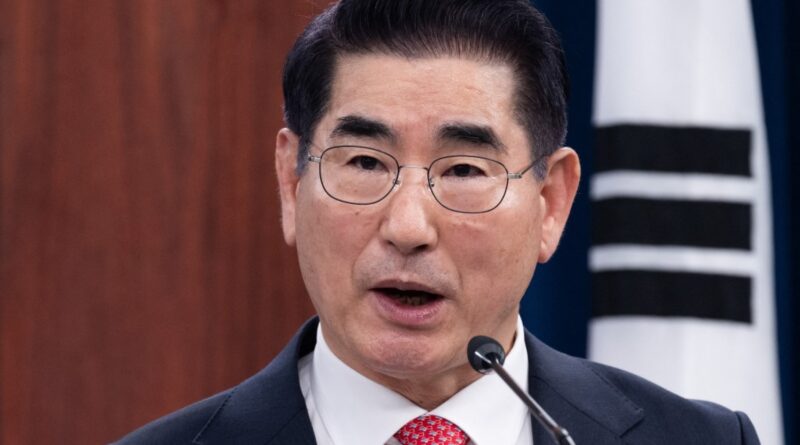South Korea detains ex-defense chief Kim Yong Hyun over martial law imposition
South Korean prosecutors on Sunday detained a former defense minister who allegedly recommended last week’s brief but stunning martial law imposition to President Yoon Suk Yeol, making him the first figure detained over the case, news reports said.
The reported development came a day after Yoon avoided an opposition-led bid to impeach him in parliament, with most ruling party lawmakers boycotting a floor vote to prevent the two-thirds majority needed to suspend his presidential powers.
The main liberal opposition Democratic Party said it will prepare a new impeachment motion against Yoon.

On Sunday, ex-Defense Minister Kim Yong Hyun voluntarily appeared at a Seoul prosecutors’ office, where he had his mobile phone confiscated and was detained, Yonhap news agency reported.
Other South Korean media carried similar reports, saying Kim was moved to a Seoul detention center. The reports said police were searching Kim’s former office and residence on Sunday.
Repeated calls to the Seoul Central District Prosecutors’ Office, the Supreme Prosecutors’ Office and the National Police Agency were unanswered.
An official at the detention facility in eastern Seoul hung up the phone when The Associated Press called.
Yoon accepted Kim’s resignation offer on Thursday after opposition parties submitted a separate impeachment motion against him.

Kim is a central figure in Yoon’s martial law enforcement, which led to special forces troops encircling the National Assembly building and army helicopters hovering over it.
The military withdrew after the parliament unanimously voted to overturn Yoon’s decree, forcing his Cabinet to lift it before daybreak Wednesday.
Park Se-hyun, chief of the Seoul High Prosecutors Office, said in a televised statement that the prosecution was investigating the martial law incident with a 62-member team, including both public and military prosecutors, and pledged a thorough probe that would “leave no suspicions.”


In Kim’s impeachment motion document, the Democratic Party and other opposition parties accused him of proposing martial law to Yoon. Ruling People Power Party leader Han Dong-hun made a similar comment on Kim’s role.
Vice Defense Minister Kim Seon Ho told parliament that Kim Yong Hyun ordered the deployment of troops to the National Assembly.
The Democratic Party called Yoon’s martial law imposition “unconstitutional, illegal rebellion or a coup.” It has filed complaints with police against at least nine people, including Yoon and Kim, over the alleged rebellion.

In a statement distributed by the Defense Ministry on Wednesday, Kim said that “all troops who performed duties related to martial law were acting on my instructions, and all responsibility lies with me.”
Prosecutor General Shim Woo Jung told reporters on Thursday the prosecution plans to investigate the rebellion charges against Yoon following complaints filed by the opposition.
While the president mostly has immunity from prosecution while in office, that does not extend to allegations of rebellion or treason. It wasn’t immediately clear how the prosecution plans to proceed with an investigation into Yoon.

The Defense Ministry said it has suspended three top military commanders over their alleged involvement in the martial law imposition. They were among those facing the opposition-raised rebellion allegations.
Han said Sunday the ruling party will try to make sure that investigations of those involved in the martial law imposition would be conducted in a transparent manner. But the Democratic Party said authorities should immediately arrest Yoon and all others implicated in the case.
On Saturday, Yoon issued an apology over the martial law decree, saying he won’t shirk legal or political responsibility for the declaration and promising not to make another attempt to impose it. He said would leave it to his party to chart a course through the country’s political turmoil, “including matters related to my term in office.”

AFP via Getty Images
Since taking office in 2022, Yoon has struggled to push his agenda through an opposition-controlled parliament and grappled with low approval ratings amid scandals involving himself and his wife. In his martial law announcement on Tuesday night, Yoon called parliament a “den of criminals” bogging down state affairs and vowed to eliminate “shameless North Korea followers and anti-state forces.”
The declaration of martial law was the first of its kind in more than 40 years in South Korea. The turmoil has paralyzed South Korean politics and sparked alarm among key diplomatic partners like the U.S. and Japan.
The scrapping of Yoon’s impeachment motion is expected to intensify protests calling for his ouster and deepen political chaos in South Korea, with a survey suggesting a majority of South Koreans support the president’s impeachment. Yoon’s martial law declaration drew criticism from the ruling party, but it is determined to oppose Yoon’s impeachment apparently because it fears losing the presidency to liberals.

In a joint address with Prime Minister Han Duck-soo on Sunday, Han, the ruling party chief, said the PPP will work with the government to chart out Yoon’s early and orderly exit from office in a way that minimizes confusion, but he didn’t say when that would happen.
The ruling party chief claimed Yoon will not be involved in state affairs, including foreign policy, but it wasn’t immediately clear whether that would align with the constitution.
Han Duck-soo said the government will work with the ruling party on state affairs but didn’t make any comments that supported Han Dong-hun’s remarks on Yoon’s early exit or his exclusion from state affairs. Yoon’s presidential office didn’t immediately respond.

The Democratic Party criticized Han Dong-hun’s comments, saying that the exclusion of an incumbent president from state affairs isn’t supported by the constitution.
Kim Min-seok, head of a party task force on the martial law case, said that Yoon’s immediate impeachment is the only way to resolve the turmoil. He said Han Dong-hun, who holds no government post, has no constitutional rights to be involved in handling state affairs.

